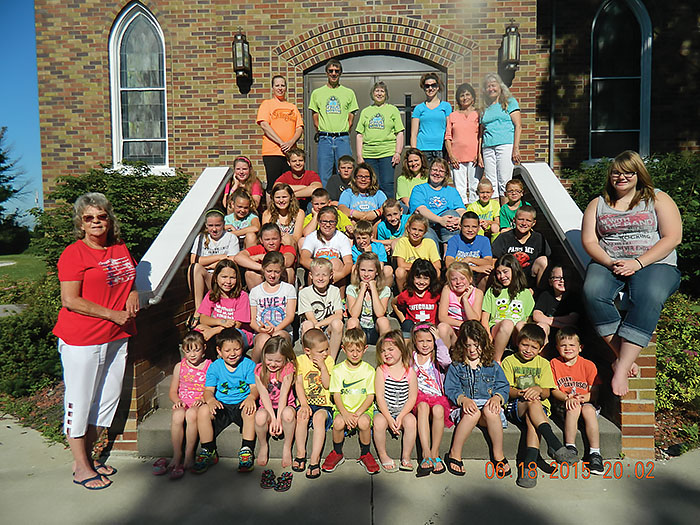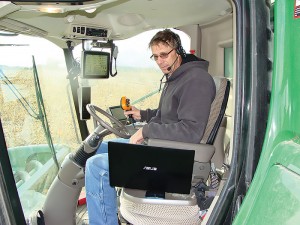
Concordia Seminary Newsroom
A bountiful harvest

Farming and the church are both deeply ingrained in Steve Struecker’s life. It would be hard to leave one for the other. Fortunately, he doesn’t have to.
A student in the Specific Ministry Pastor (SMP) program at Concordia Seminary, Struecker is a lifelong farmer born and raised in West Bend, Iowa, two and a half hours north of Des Moines in The Lutheran Church—Missouri Synod (LCMS) Iowa District West. Struecker and his son, Andrew, along with a partner, grow corn and soybeans on a large farm that has been in his family since 1870. For most of his life he has worshiped at St. Paul’s Lutheran Church in nearby Whittemore, Iowa.

This summer’s vacation Bible school at Zion Lutheran Church in Lu Verne, Iowa, as pictured on June 18, 2015, the largest in years, brought many children and their families to church, most for the first time. Vicar Steve Struecker, top row, second from left, is thankful for this opportunity to share the Gospel with so many new faces. Photo: Kathleen Struecker
“I’ve been active in the church all my life,” Struecker said. “But I didn’t grow up wanting to be a pastor. I’ve always wanted to be a farmer.” As he became increasingly involved at his congregation, he realized there were other rural churches that needed help, too. Struecker’s response to that was to complete the deacon program through the district in conjunction with Concordia University St. Paul, in St. Paul, Minn., enabling him to fill in for pastors at rural congregations in his area when needed.
With mentoring by Dr. Steve Turner at Trinity Lutheran Church in Algona, Iowa, who was recently elected president of the LCMS Iowa District West, Struecker began helping out every other week at Immanuel Lutheran Church in Livermore, Iowa, and Zion Lutheran Church in Lu Verne, Iowa, both congregations in small towns of about 250 people. He found he enjoyed rural pastoral ministry, despite the extra time it required. When the pastor at one of the churches retired, and with the encouragement of his mentor and other pastors in the circuit, Struecker decided he wanted to do something more.
“As a deacon I was able to preach, but I had the desire to bring more stability to these congregations,” Struecker said. “They needed a pastor, and I thought, either I do something or they would both close. Everyone had given up on them, but I wasn’t willing to do that.” With Turner’s support and encouragement, Struecker decided to enter the SMP program at the Seminary. That meant both congregations, each worshiping 30-40 people per weekend, would remain open, and Struecker could continue farming while also shepherding the congregations.
“The SMP program continues to do what it was designed to do, and it is doing it well: forming pastors in specific ministry contexts and situations who otherwise would not be able to benefit from a seminary program leading to Synod certification and ordination,” said Dr. Andrew Bartelt, director of the Seminary’s SMP program. “While rostered as specific ministry pastors, these men are well-qualified to bring the gifts of God’s Word and the Sacraments as administered through the pastoral office to those who otherwise would not have any regular or full-time pastoral ministry.”

Thanks to modern technology, Vicar Steve Struecker is able to participate in online courses and discussions while out in the field in his combine, Nov. 2, 2013. Photo: Kathleen Struecker.
Technically a vicar, Struecker now leads worship at both churches every Sunday. He begins with an early service at Immanuel at 8:30 a.m., and then heads over to Zion, 15 minutes away, for a 10 a.m. service. The timing is cutting it close, but Struecker and his wife, Kathleen, make it work. Apart from Sunday services, he also attends to the pastoral care needs of both congregations, something he enjoys and wasn’t able to do as a deacon.
“Steve is a good example of the SMP program meeting the changing needs of the church,” said Rev. Wally Becker, assistant director of the SMP program. “He is serving the pastoral needs of two small congregations that possibly would no longer exist except for someone like Steve taking care of them on a part-time basis.”
When he completes the program, Struecker will receive a certificate to serve as pastor at both churches. He is halfway through the program and will be ordained in December 2015.
“Our farm has been in my family for generations, so walking away from farming to go to the Seminary just wouldn’t work for me,” he said. “The SMP program provides a great alternative. I get to study to become a pastor and continue farming.”
Through weekly online classes, residential seminars, and intensives, SMP students complete 16 courses that are taught sequentially, one per academic quarter. The program typically takes four years to complete and students stay with the same group of men, their cohort, for their entire course of study.
“Many SMP students are bi-vocational, working full-time jobs and serving a congregation on a part-time basis,” Becker said. “The extra coursework and studying adds even more time to an already busy schedule, and these men need to manage their time well in order to make sure they also have time for themselves and their families. Our SMP students are really making it work.”
It is a lot of work, but with the support of his wife, Struecker manages to balance his studies with his farm work. In fact, Struecker often finds time to complete his studies in an unusual place — inside his combine and tractors while out in the fields.
“With computers and satellites, we don’t have to drive the machines anymore,” he said. “During the busy spring and fall seasons, I’ll take my computer along in the combine or the tractor and can be participating online with the rest of the group for the Monday night classes.”
Through the SMP program, Struecker and others can fulfill their calling to serve the Church in both Word and Sacrament, while also serving in another vocation. In Struecker’s case, two congregations remain open and he can continue to farm the land that’s been in his family for generations. It’s beneficial to his community, too. Case in point: This summer’s vacation Bible school at Zion was bigger than ever, and provided 38 children and their families, many of them unchurched, with an opportunity to learn more about Jesus. That’s extra work Struecker is glad to have.
The need for pastors is great, and the SMP program is one of the ways God is bringing more shepherds to His flock. To find out more about the SMP program, visit www.csl.edu/smp.